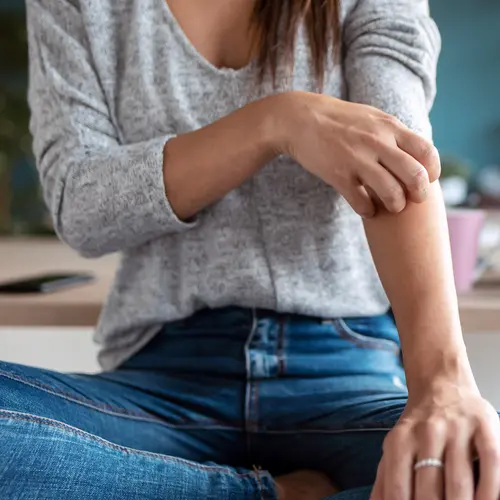Psoriasis can make your skin crawl. It itches. It burns. It hurts.
So when a flare turns painful, you want relief -- ASAP. Having some remedies on hand can soothe your sore skin when you need it the most.
Before you do anything, make sure you don’t have a bigger problem on your hands. If the pain is really bad or your skin is crusty yellow or oozing, call your doctor. That’s a sign of an infection. It can spread and become much worse than a regular flare. You may need an antibiotic.
Otherwise, try these self-care tips for the pain and itch.
Quench thirsty skin. Your psoriasis may be uncomfortable because your skin is dry, scaly, and inflamed. A moisturizer is your friend. Thicker or greasier is usually better. Pick creams and ointments that come in a tub or tube. Lotions, on the other hand, tend to be watered down. Look for moisturizers with an ingredient called ceramide. Even something as basic as petroleum jelly can help your skin and lock in moisture.
Soften scales. Lotions with salicylic, lactic, or glycolic acids can break up dead skin cells that build up on psoriasis plaques. Slather it on at night and cover the area with plastic wrap. This helps keep the lotion in place so your skin absorbs it better.
Turn up the heat. The ingredient that makes chili peppers hot can ease pain. Check your drugstore for products with capsaicin. This can block nerve endings that transmit pain. One study showed it may help psoriasis pain, redness, swelling and other symptoms.
Knock out itch. Several over-the-counter medications can control itch -- which can feel more like a burning or biting feeling when you have psoriasis. Ask your pharmacist for lotions and creams with pramoxine or menthol. Hydrocortisone, a mild steroid, can help, too.
Resist the urge to scratch. That only makes it worse and can injure your skin, which makes it hurt even more.
Chill out. Cold packs can take the itch out by short-circuiting the itch-scratch cycle. They “confuse” your brain because it’s hard for it to feel itch and cold at the same time.
Take a soak. Draw a warm bath and sprinkle in some Epsom salts. Soak for about 15 minutes. This soothing brew helps remove scales and eases itch. Oatmeal baths can take the tickle out, too. After your bath, pat your skin dry and put on moisturizer right away.
Alternative Treatments
Thinking outside the box may do you some good. Consider these non-mainstream therapies to put the brakes on discomfort and improve your psoriasis.
Wash with vinegar. Apple cider vinegar can help soothe itchy scalp psoriasis. Massage it into your scalp a few times a week. If it burns your head, use a half water-half vinegar mixture. Or rinse your scalp after the vinegar dries to prevent irritation. If it’s going to work, you should see results in about 2 weeks. Take a pass if your scalp is cracked or bleeding.
Needle your pain. Acupuncture stimulates specific points on your body, most often with thin needles inserted into the skin. It’s often used to treat pain. In China and elsewhere in Asia, it’s widely used for psoriasis.
Some studies show acupuncture doesn’t make a meaningful difference, while others find it helps. One recent study found that acupuncture therapies were simple, effective, and had few side effects.
Run it by your doctor before you get acupuncture.
Relax. Stress is a trigger for psoriasis. So try to find ways to relax if you have it.
Meditation can relieve anxiety. Sit comfortably on the floor with your eyes closed. For 15 minutes, put all other thoughts out of your mind, and just focus on your breathing. You can use an app, too.
Exercise boosts your mood and can fight anxiety. One big study found that women who exercise vigorously are less likely to get psoriasis than women who are less active.
Remember, self-care remedies don’t replace your doctor’s treatment plan. Call them if your psoriasis gets worse, you’re depressed, your skin is red all over, or your joints hurt.

